Booksellers are marketing Google eBooks in a variety of creative ways,
Bookselling This Week reported. For example, among other steps, the Book Bin, Northbrook Ill., is offering loaner Sony Readers, has featured a range of e-readers in a store display and has a large sign in-store announcing that it is selling e-books.
Rainy Day Books, Fairway, Kan., is promoting e-books in a variety of ways and will highlight a handful of e-book titles in its weekly newsletter.
Several booksellers, including the Tattered Cover, Denver, Colo., and Kepler's, Menlo Park, Calif., are considering or are offering discounts on non-agency model e-book titles. Kepler's has promoted "aggressive discounts" on five such titles.
(For more on indies and Google eBooks, see Robert Gray's column below.)
---
 Is your e-book spying on you? NPR
pointed out that the same technology that allows users to instantly
download books also allows information to be
transmitted back to the manufacturer. "And
it's not just what pages you read; it may also monitor where you
read them. Kindles, iPads and other e-readers have geo-location
abilities; using GPS or data from Wi-Fi and cell phone towers, it wouldn't be
difficult for the devices to track their own locations in the physical world."
Cindy Cohn, legal director at the Electronic Frontier
Foundation, noted
Is your e-book spying on you? NPR
pointed out that the same technology that allows users to instantly
download books also allows information to be
transmitted back to the manufacturer. "And
it's not just what pages you read; it may also monitor where you
read them. Kindles, iPads and other e-readers have geo-location
abilities; using GPS or data from Wi-Fi and cell phone towers, it wouldn't be
difficult for the devices to track their own locations in the physical world."
Cindy Cohn, legal director at the Electronic Frontier
Foundation, noted 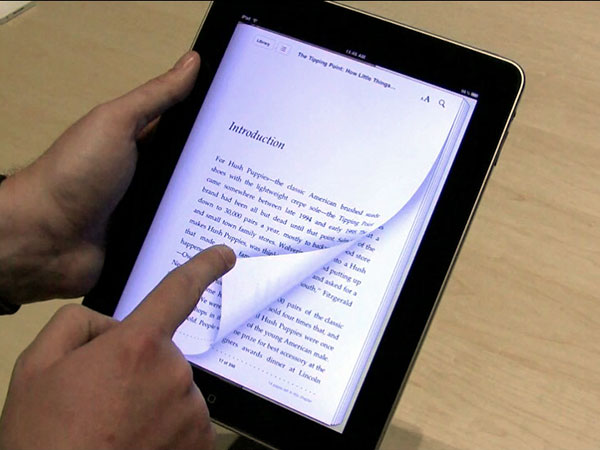 that if the company
keeps the data long-term, the information could be subpoenaed to check
someone's alibi, or as evidence in a lawsuit. EFF has created a side-by-side
comparison of e-book devices.
that if the company
keeps the data long-term, the information could be subpoenaed to check
someone's alibi, or as evidence in a lawsuit. EFF has created a side-by-side
comparison of e-book devices.
Author Scott Turow, president of the Authors Guild, is
particularly concerned with the large amount of information Amazon captures: "They could tell you with precision the
age, the zip codes, gender and other interests of the people who bought my
books. Now you can throw on top of that the fact that a certain number of them
quit reading at Page 45."
Publishing consultant Brian O'Leary, founder
of Magellan Media, said such data could benefit the rest of the publishing industry. "If people are buying books but not reading them, or
they're quitting after a relatively short period of time reading the book, that
ultimately tells you that the customer in this case is dissatisfied,"
O'Leary said. "Better understanding when people stop reading or stop
engaging with your content would help you create better products."
---
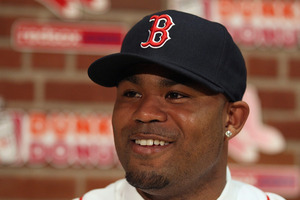 The New Yorker has an amusing line score for the story that Carl Crawford, who just signed a contract with the Boston Red Sox for $142 million and had said recently that he hadn't read a book "in forever," planned to spend part of his fabulous wealth to open an antiquarian bookstore. The item, taken seriously by a few too many people, was originally posted at Royals Review, a blog for Kansas City Royals fans.
The New Yorker has an amusing line score for the story that Carl Crawford, who just signed a contract with the Boston Red Sox for $142 million and had said recently that he hadn't read a book "in forever," planned to spend part of his fabulous wealth to open an antiquarian bookstore. The item, taken seriously by a few too many people, was originally posted at Royals Review, a blog for Kansas City Royals fans.
---
"In what sports did Samuel Beckett, Albert Camus and Howard Jacobson demonstrate their prowess?" The Guardian
has invited readers to "test your literary knowledge with a fiendish
set of questions from our panel of writers including Iain Banks, Jilly
Cooper, David Hare, Nick Hornby, Lorrie Moore and Will Self."
---
The official trailer for Water for Elephants has been released and will begin appearing in theaters today. The movie of the popular book by Sara Gruen stars Reese Witherspoon, Christoph Waltz, Robert Pattinson, Hal Holbrook and Tai the elephant. The movie opens nationwide next April 15.
---
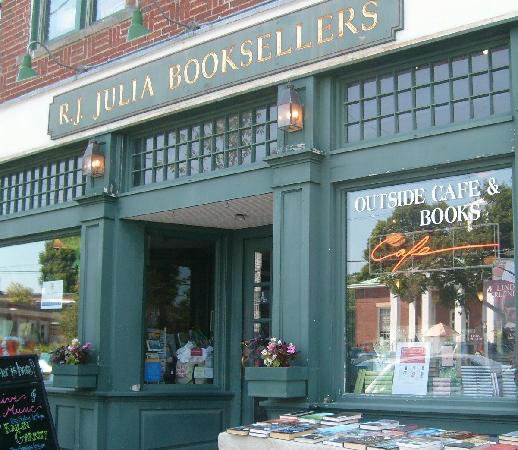 Lori Fazio, the new manager of R.J. Julia Booksellers, Madison, Conn., introduced herself to the community in an op-ed article for the Shoreline Times,
where she wrote: "I'm continually surprised by how many people tell me
they either have moved to Madison or are thinking of moving to town
because of the bookstore. They mention the books, the café, and the
booksellers, but what I think they are really responding to is a
wonderful sense of a lively, thriving downtown. We--and I mean all of us
who live in this area--take great pride in our beautiful downtown, our
strong schools, picturesque ocean-front, and intimate way of life. Our
small local businesses add character, ambiance, and community (not to
mention commerce) to this already great place to live."
Lori Fazio, the new manager of R.J. Julia Booksellers, Madison, Conn., introduced herself to the community in an op-ed article for the Shoreline Times,
where she wrote: "I'm continually surprised by how many people tell me
they either have moved to Madison or are thinking of moving to town
because of the bookstore. They mention the books, the café, and the
booksellers, but what I think they are really responding to is a
wonderful sense of a lively, thriving downtown. We--and I mean all of us
who live in this area--take great pride in our beautiful downtown, our
strong schools, picturesque ocean-front, and intimate way of life. Our
small local businesses add character, ambiance, and community (not to
mention commerce) to this already great place to live."
---
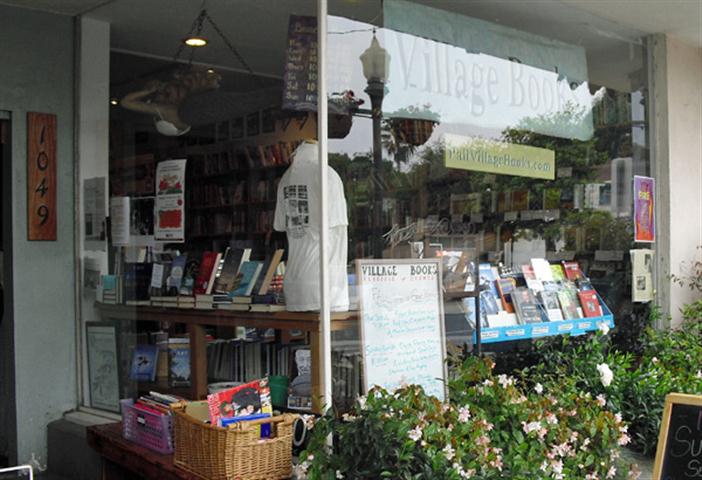 Village Books, Pacific Palisades, Calif., was showcased as "bookstore of the week" by the Los Angeles Times Jacket Copy blog.
Village Books, Pacific Palisades, Calif., was showcased as "bookstore of the week" by the Los Angeles Times Jacket Copy blog.
"We live in the kind of community where you know customers by name--it is the Cheers
of a bookstore," said owner Katie O'Loughlin, who opened her shop in
1997. "You know what they like to read; it really is an old-fashioned,
Mayberry-type setting. I lived here before I opened the store--I knew a
lot of people from being a mother, being involved in church and school."
---
The Reuters holiday spirit: the lede for an article about the challenges faced by Barnes & Noble and Borders begins "The two largest U.S. bookstore chains have offered up a compelling cliffhanger this holiday season that will seal the fate of brick-and-mortar bookselling."
---
BoingBoing offered offered its eccentric holiday book list.
---
The Philadelphia Inquirer featured a "cornucopia of good books for cooks."
---
A gift guide to the year's "Best Books for Music Obsessives" was offered by Flavorwire,
which noted: "If music writing was endangered in 2010--and oftentimes
it felt that way--it was also on fine display on the nation's
bookshelves."
---
 Italy will be the guest of honor at BookExpo America's Global Market Forum. BEA, which will be held May 23-26 in New York City, will showcase Italian publishers, books and authors. At the same time, literary and related cultural programs that focus on contemporary fiction in translation and in original editions, imports and exports of original books, children's and YA literature and digital developments in the U.S. and Italy will be held throughout New York City as part of New York Book Week.
Italy will be the guest of honor at BookExpo America's Global Market Forum. BEA, which will be held May 23-26 in New York City, will showcase Italian publishers, books and authors. At the same time, literary and related cultural programs that focus on contemporary fiction in translation and in original editions, imports and exports of original books, children's and YA literature and digital developments in the U.S. and Italy will be held throughout New York City as part of New York Book Week.
Previous Global Market Forum focuses and guests of honor were Spain (this year), the Arab World (2009) and Global English Reading (2008).
For more information, per favore contact Ruediger Wischenbart at ruediger@wischenbart.com.
---
Maruzen Co. and Junkudo Co. will jointly open Japan's
largest bookstore, "with the aim of being able to offer any book sought
by customers," Japan Today reported.
---
At the Morrow/Avon division of HarperCollins:
Ben Bruton has been promoted to senior director of publicity. Before joining Morrow in 2004, he worked at Putnam, Doubleday and Atria.
Brianne Halverson has been promoted to director of publicity. She joined HarperCollins as a publicity manager in 2007 and earlier worked at Simon & Schuster.
 altering the conditions of the conversation, e-books and e-readers have already served an essential purpose.... This, I think, is what e-books have to offer: the promise of immersion, enhanced or otherwise, just as their analog counterparts have always done."
altering the conditions of the conversation, e-books and e-readers have already served an essential purpose.... This, I think, is what e-books have to offer: the promise of immersion, enhanced or otherwise, just as their analog counterparts have always done."









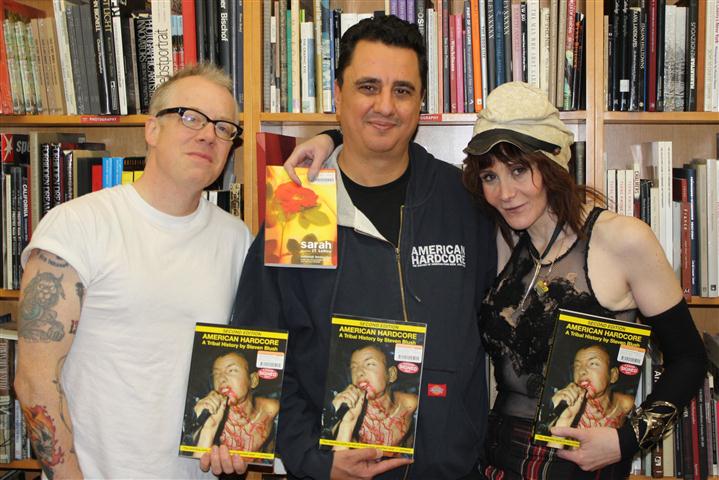 At a slideshow and discussion about the cultural importance of American hardcore music at the Strand Book Store, New York City: (from l. to r.) hardcore punk singer Dave Smalley; Steven Blush, author of American Hardcore: A Tribal History (Feral House); and Avenue A skinhead-turned-notorious-author Laura Albert (aka JT Leroy, aka "Literary Outlaw").
At a slideshow and discussion about the cultural importance of American hardcore music at the Strand Book Store, New York City: (from l. to r.) hardcore punk singer Dave Smalley; Steven Blush, author of American Hardcore: A Tribal History (Feral House); and Avenue A skinhead-turned-notorious-author Laura Albert (aka JT Leroy, aka "Literary Outlaw").
 Is your e-book spying on you?
Is your e-book spying on you?  that if the company
keeps the data long-term, the information could be subpoenaed to check
someone's alibi, or as evidence in a lawsuit. EFF has created a
that if the company
keeps the data long-term, the information could be subpoenaed to check
someone's alibi, or as evidence in a lawsuit. EFF has created a  The
The  Lori Fazio, the new manager of
Lori Fazio, the new manager of 
 Italy will be the guest of honor at BookExpo America's Global Market Forum. BEA, which will be held May 23-26 in New York City, will showcase Italian publishers, books and authors. At the same time, literary and related cultural programs that focus on contemporary fiction in translation and in original editions, imports and exports of original books, children's and YA literature and digital developments in the U.S. and Italy will be held throughout New York City as part of New York Book Week.
Italy will be the guest of honor at BookExpo America's Global Market Forum. BEA, which will be held May 23-26 in New York City, will showcase Italian publishers, books and authors. At the same time, literary and related cultural programs that focus on contemporary fiction in translation and in original editions, imports and exports of original books, children's and YA literature and digital developments in the U.S. and Italy will be held throughout New York City as part of New York Book Week.
 Kathy Kitsuse, longtime general manager and co-owner of
Kathy Kitsuse, longtime general manager and co-owner of  Some 200 of the best and brightest literary digerati crowded into a
ballroom at the New Yorker Hotel in Midtown Manhattan all day this past
Wednesday for Media Bistro's eBookSummit. Panelists and speakers included Ken
Auletta, Douglas Rushkoff, Richard Nash, Jason Ashlock, Debbie Stier, Peter
Costanzo, Ryan Chapman, Brendan Cahill and more. Perhaps overshadowing the
high-caliber speaking roster were the buzzwords of the day: "transmedia,"
"multiplatform," "social" (as in "you have to do
social if you want your app to succeed"), "discoverability" and "metadata."
(Savannah Ashour, the new director of digital publishing at Workman, wanted the
word "transmedia" banned.)
Some 200 of the best and brightest literary digerati crowded into a
ballroom at the New Yorker Hotel in Midtown Manhattan all day this past
Wednesday for Media Bistro's eBookSummit. Panelists and speakers included Ken
Auletta, Douglas Rushkoff, Richard Nash, Jason Ashlock, Debbie Stier, Peter
Costanzo, Ryan Chapman, Brendan Cahill and more. Perhaps overshadowing the
high-caliber speaking roster were the buzzwords of the day: "transmedia,"
"multiplatform," "social" (as in "you have to do
social if you want your app to succeed"), "discoverability" and "metadata."
(Savannah Ashour, the new director of digital publishing at Workman, wanted the
word "transmedia" banned.)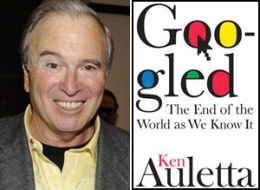 Ken Auletta related interviews he'd had with Google executives and
engineers while writing Googled (just
out in paper from Penguin). Google's managers are "not cold businessmen,"
he said. "They're cold engineers." In other words, they're not out to
crush their rivals (like Microsoft in the '90s). Rather the company can't not ask "why
not?" Their impulse to question the foundations of every business they
look into is driving change at a dizzying pace. Auletta pointed out that while electricity
took 70 years to reach half of the American people, the Internet took nine to
do the same, and Facebook has reached 550 million users in just five years. "What
scares the shit out of a lot of people is the velocity of change," Auletta
said.
Ken Auletta related interviews he'd had with Google executives and
engineers while writing Googled (just
out in paper from Penguin). Google's managers are "not cold businessmen,"
he said. "They're cold engineers." In other words, they're not out to
crush their rivals (like Microsoft in the '90s). Rather the company can't not ask "why
not?" Their impulse to question the foundations of every business they
look into is driving change at a dizzying pace. Auletta pointed out that while electricity
took 70 years to reach half of the American people, the Internet took nine to
do the same, and Facebook has reached 550 million users in just five years. "What
scares the shit out of a lot of people is the velocity of change," Auletta
said. Jenny Frost tweeted: "cold outside but room is full of dreams."
A few of those dreams may have to do with the publishing industry surviving
this digital upheaval in a recognizable form. Some participants are ready to
dispense with what worked in the past and move on. "I don't feel that we
have to be sacred about anything except trying to deliver some really good
content," said Brad Inman, on embedded video and how it can interrupt
narrative flow. Douglas Rushkoff had a more hopeful view: "What is the
future of the bookstore? It's the past of the bookstore--little bookstores. The
big box thing is over, or it's ending. Aggregators get aggregated." Firms
that attempt to do it all are endangered by a public that is willing to do
things for themselves, with a little help from the experts. The experts are ready
for them.--
Jenny Frost tweeted: "cold outside but room is full of dreams."
A few of those dreams may have to do with the publishing industry surviving
this digital upheaval in a recognizable form. Some participants are ready to
dispense with what worked in the past and move on. "I don't feel that we
have to be sacred about anything except trying to deliver some really good
content," said Brad Inman, on embedded video and how it can interrupt
narrative flow. Douglas Rushkoff had a more hopeful view: "What is the
future of the bookstore? It's the past of the bookstore--little bookstores. The
big box thing is over, or it's ending. Aggregators get aggregated." Firms
that attempt to do it all are endangered by a public that is willing to do
things for themselves, with a little help from the experts. The experts are ready
for them.-- Thirteen-year-old Thomas Horn, who won $31,800 on Kids Jeopardy in October, is joining a cast that includes Sandra Bullock and Tom Hanks to play Oskar Schell in the film verson of Jonathan Safran Foer's Extremely Loud and Incredibly Close, according to the
Thirteen-year-old Thomas Horn, who won $31,800 on Kids Jeopardy in October, is joining a cast that includes Sandra Bullock and Tom Hanks to play Oskar Schell in the film verson of Jonathan Safran Foer's Extremely Loud and Incredibly Close, according to the  Thomas Hurka is the author of The Best Things in Life: A Guide to What Really Matters (Oxford, December 17, 2010), a philosophical survey of things that
make life worth living: pleasure, happiness, knowledge, achievement, virtue,
love and more. His previous writings include Perfectionism (Oxford 1993) and Virtue, Vice, and
Value (Oxford 2003), and he had a
three-year stint as a weekly philosophy columnist for the Globe and Mail. He teaches philosophy at the
University of Toronto and lives in Toronto with his wife and son.
Thomas Hurka is the author of The Best Things in Life: A Guide to What Really Matters (Oxford, December 17, 2010), a philosophical survey of things that
make life worth living: pleasure, happiness, knowledge, achievement, virtue,
love and more. His previous writings include Perfectionism (Oxford 1993) and Virtue, Vice, and
Value (Oxford 2003), and he had a
three-year stint as a weekly philosophy columnist for the Globe and Mail. He teaches philosophy at the
University of Toronto and lives in Toronto with his wife and son.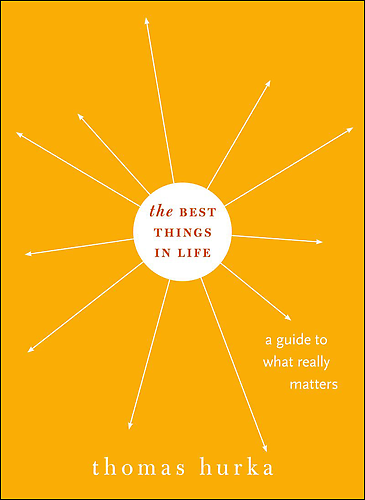 On your nightstand now:
On your nightstand now: 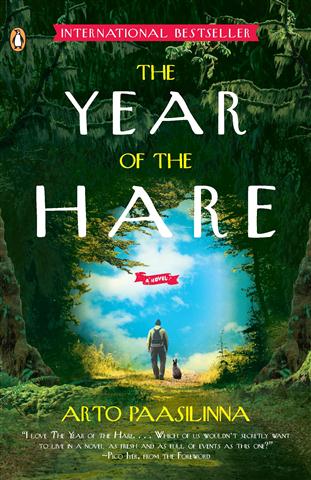 The sheer literary delight of Arto Paasilinna's comic novels is one of the best-kept secrets in Finland. Until now the only evidence of this in English translation has been the superb novel The Howling Miller and, like it, The Year of the Hare is a spare narrative about a social misfit that builds with an unexpected cumulative impact. These are tall tales that are halfway between fairy tales and fables, yet decidedly realistic in all their details and their depictions of the human race. Paasilinna puts his money on the outsider, the rule-breaker, the good man outside of society who is condemned for listening to a different drummer.
The sheer literary delight of Arto Paasilinna's comic novels is one of the best-kept secrets in Finland. Until now the only evidence of this in English translation has been the superb novel The Howling Miller and, like it, The Year of the Hare is a spare narrative about a social misfit that builds with an unexpected cumulative impact. These are tall tales that are halfway between fairy tales and fables, yet decidedly realistic in all their details and their depictions of the human race. Paasilinna puts his money on the outsider, the rule-breaker, the good man outside of society who is condemned for listening to a different drummer.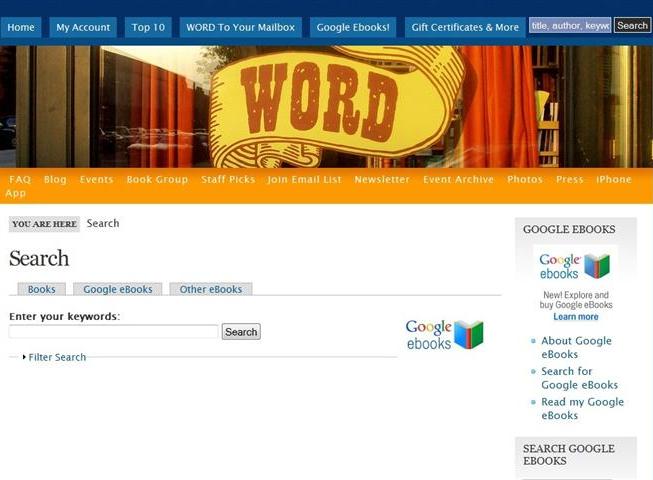 "If being able to sell e-books allows us to serve our community in one more way, then it's a no-brainer for me. People already look to us to help curate the vast world of books for them, so we'll have to start doing that for e-books as well. People will want to support us if we make it easy enough, I think, and this has made it pretty easy."--Christine Onorati, owner of
"If being able to sell e-books allows us to serve our community in one more way, then it's a no-brainer for me. People already look to us to help curate the vast world of books for them, so we'll have to start doing that for e-books as well. People will want to support us if we make it easy enough, I think, and this has made it pretty easy."--Christine Onorati, owner of